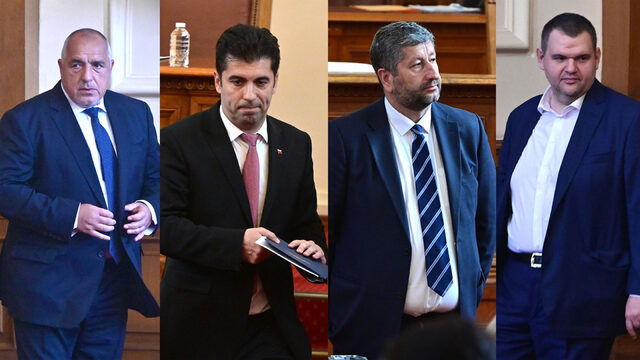As the date (6 March) looms for the awaited rotation between Deputy Prime Minister and Foreign Minister Mariya Gabriel and current PM Nikolay Denkov, who should in turn swap roles and become the prime minister and deputy PM respectively, tensions in the ruling majority have boiled over.
The big question is whether these rising tensions will lead to anything consequential - like a break-up in the quasi-coalition between WCC-DB and GERB (jokingly called "the assemblage" by its critics and many of the politicians from the two factions themselves) and new elections. Will there be a substantial rebalancing of power in favor of GERB or something completely unexpected - like GERB and MRF ousting the reformist forces in a coup de grace and officializing their relationship without the nuisance of WCC-DB?
So far, all of these scenarios seem rather unlikely. It appears that, despite the surface-level tensions between the two factions, neither side is willing to risk dismantling "the assemblage" - and trigger an early vote. There are certainly ministerial seats, among other things, that are currently being bargained over, but it seems there will be a relatively smooth transition.
Rotation, early elections - or something else?
Last Friday, the two ruling parties began arguing over who should nominate the foreign minister after the rotation. GERB leader Boyko Borissov (once again) threatened early elections. "Mariya Gabriel - PM. The foreign ministry, the only one we have - stays with us", he insisted, otherwise "there will be no rotation", but instead the threat of 2 in 1 elections (combined with those of the EU) in early June.
It seems that the ex-PM is in a position to dictate terms. According to a Market Links survey from last week, GERB has a growing lead over the WCC-DB coalition, support for which has fallen by 7 percentage points since last April's elections. What is more, the poll shows that Borissov is the highest rated parliamentarian, while his party's Gabriel is the highest rated minister. Also, the majority of respondents expect changes in the government to pass without any particular turmoil between the partners in power.
These electoral attitudes give Borissov the opportunity to choose which is more advantageous for GERB - rotation or early elections. There is another option - a continuation of the status quo from the past nine months, which might play to both GERB and MRF's advantage, as the government, which is nominally led by WCC-DB, has been fulfilling the wishes of Borissov and MRF leader-designate Delyan Peevski, without them being culpable for the consequences of the cabinet's actions. And by claiming that they are not participating in it, they can blackmail with threats to "dismantle" the majority at all times. As for the six big priorities agreed to between the formations - it seems that they might be postponed until after the European vote.
In short, early elections can be ruled out as an alternative to rotation. But as it seems, the intrigue now is not so much about the PM's post as it is the foreign minister's.

Why has the foreign ministry suddenly become so important?
The two camps in the negotiations surrounding the rotation have very different objectives. First of all, Borissov and Peevski not only want to retain control over those parts of the government they now wield (individual ministries such as the Interior Ministry, middle and lower levels of the administration, the judiciary and regulators), but also to expand it. At the same time, they do not want their power-grab to be open, and at this stage it is very important for them how they are seen in the West - because of their corrupt reputation that was clearly established in the last three years.
On the other hand, WCC-DB are aiming to reclaim space from the captured elements of the state and push through the more serious reforms it pledged to carry out, such as those of the judiciary and the intelligence services, and it is important for them to maintain external support for these policies. It is especially important with the declining domestic support for them because of the unpopularity of their quasi-coalition relationship with GERB and MRF.
The common denominator between the two camps is that they are both seeking external legitimacy for their domestic goals: WCC-DB aims to maintain their advantage as the preferred Bulgarian partner party for the EU and the US (whereas GERB and MRF have recently been considered toxic) while GERB seeks to regain the same role they had until 2021. Hence, both sides seem to see the Foreign Minister position as their party's "window to the world."
It is, however, also entirely possible that GERB have been raising the stakes surrounding the MFA in order to try and bargain it for other, more valuable ministries they prize, including Defense and Agriculture. Despite recurring speculation about the future of Defense Minister Todor Tagarev, at least for now it seems he will survive the rotation. The same cannot be said about some other ministers, like those of Health and eGovernment - Hristo Hinkov and Alexander Yolovski, who are certain to go after 6 March, alongside Social Minister Ivanka Shalapatova and Innovation Minister Milena Stoycheva.
What key decisions were left until after the rotation?
Almost the entire raison d'etre of this government is still unfulfilled and is likely to remain so until after the rotation. Of the big tasks that the cabinet and the parliament pledged to complete 9 months ago, only the constitutional amendments (which are pointless without adequate amendments to the Judiciary Act), as well as a new anti-corruption law, have been adopted so far. The latter never came into force, and no anti-corruption commission has been elected.
As for the Judiciary Act itself - a working group has been formed at the Ministry of Justice to write the texts. The problem, however, lies in their adoption by Parliament. It is expected that there will be serious clashes between WCC-DB and GERB-MRF on the parts of the law that aim to limit political influence in the judiciary.
The key topic of the composition of the state regulators and the high judicial councils is also on hold until after the rotation. So far, WCC-DB have twice announced that they would spell out mechanisms in a "detailed document", but this never happened.
As the date (6 March) looms for the awaited rotation between Deputy Prime Minister and Foreign Minister Mariya Gabriel and current PM Nikolay Denkov, who should in turn swap roles and become the prime minister and deputy PM respectively, tensions in the ruling majority have boiled over.
The big question is whether these rising tensions will lead to anything consequential - like a break-up in the quasi-coalition between WCC-DB and GERB (jokingly called "the assemblage" by its critics and many of the politicians from the two factions themselves) and new elections. Will there be a substantial rebalancing of power in favor of GERB or something completely unexpected - like GERB and MRF ousting the reformist forces in a coup de grace and officializing their relationship without the nuisance of WCC-DB?












